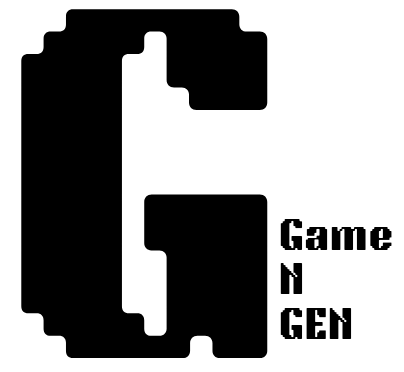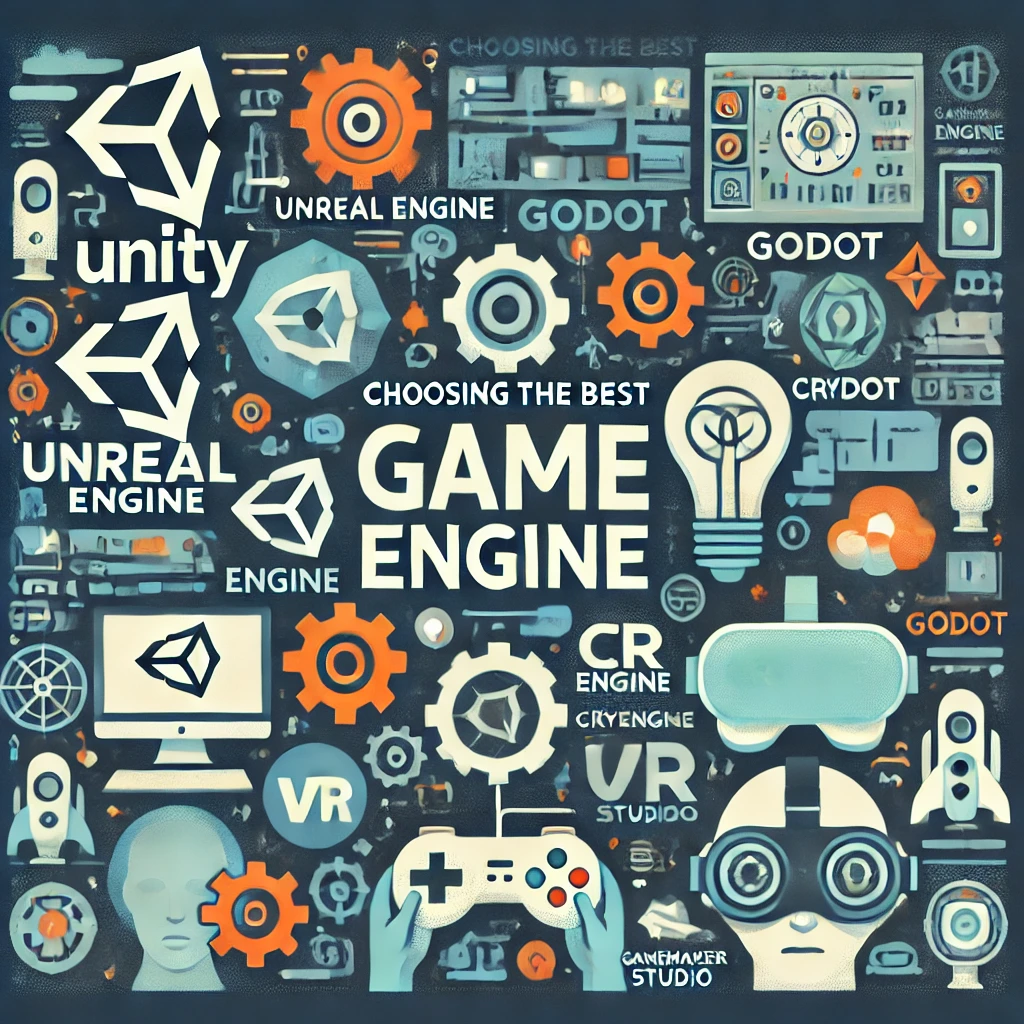Choosing the best game engine for your game development project is a critical decision. Whether you are just starting out or are an experienced developer, the right game engine can impact how smoothly your project goes, the quality of your final game, and the platforms you can release it on. With options like Unity, Unreal Engine, Godot, CryEngine, and GameMaker Studio, it’s important to understand which engine best fits your project. This guide will walk you through the key factors to consider when selecting the ideal game engine. For a more tailored recommendation, try our Game Engine Selector Tool.
Table of Contents
Understanding Game Engines: What Are They and Why Are They Important?
A game engine is a software development environment designed to build video games. It provides the core components needed to render graphics, manage physics, implement AI, and support inputs. The choice of game engine is crucial as it determines the capabilities of your game, the ease of development, and ultimately the gaming experience you provide.

Some of the most popular game engines include:
- Unity: A flexible engine used for 2D and 3D game development, popular for mobile games. Learn more about Unity on the official website.
- Unreal Engine: Known for producing high-fidelity graphics, widely used for 3D and high-performance games. Discover more about Unreal Engine on the official site.
- Godot: An open-source, beginner-friendly engine that excels in both 2D and lightweight 3D games. Visit Godot’s official website for more information.
- CryEngine: Focused on producing immersive environments, particularly suited for first-person shooters. Learn more about CryEngine on their official page.
- GameMaker Studio: Aimed at 2D games, great for beginners and indie developers looking for an easy drag-and-drop interface. Find out more about GameMaker Studio here.
Factors to Consider When Selecting a Game Engine
When choosing the best game engine for specific game development needs, it’s essential to evaluate a few key factors. Below are the most crucial considerations to help you make an informed decision. Alternatively, use the Game Engine Selector Tool to quickly find the best game engine for your requirements.
1. Game Type
The type of game you are developing is the most critical factor in engine selection. Ask yourself whether you are building a 2D, 3D, or VR/AR game.
- 2D Games: If your focus is on 2D games, Godot and GameMaker Studio are excellent choices, as they offer simplified workflows for 2D game development.
- 3D Games: For high-quality 3D graphics, Unreal Engine is the go-to, offering unmatched visual fidelity and lighting tools. Unity also supports 3D games but is easier for beginners.
- VR/AR Games: If you want to create a VR or AR experience, Unity provides a robust ecosystem and broad support for VR devices.
2. Skill Level
Your programming and game development experience level also determine the best engine.
- Beginner: Godot and GameMaker Studio are perfect for beginners, offering easy-to-use interfaces and minimal coding requirements.
- Intermediate to Advanced: Unity is great for those who have intermediate skills, with its scripting in C# and vast library of assets. Unreal Engine is better suited for advanced users due to its steep learning curve and C++ coding.
3. Platform Support
Consider the platforms you plan to launch your game on—such as PC, console, mobile, web, or VR.
- Unity is well-suited for cross-platform development, allowing you to target PC, mobile, consoles, and VR with ease.
- Unreal Engine excels on PC and console platforms, making it ideal for AAA titles.
- Godot supports web, mobile, and PC platforms, making it an excellent choice for indie games targeting a wide audience.
4. Graphics Quality
The level of graphics quality you want to achieve will significantly influence your choice.
- Unreal Engine is known for its high-fidelity graphics and is perfect for realistic visuals.
- Unity provides a balance between performance and visual quality, making it suitable for stylized graphics.
- Godot and GameMaker Studio are more focused on basic to moderate graphics and are best for simple or stylized 2D games.
5. Budget
Budget is also an important consideration when choosing a game engine.
- Godot is open source and free, making it accessible to all developers.
- Unity offers a free version but has a paid subscription for advanced features and a revenue cap.
- Unreal Engine has a royalty-based model where you pay a percentage of your earnings after your game generates a certain amount of revenue.
6. Learning Resources and Community
The availability of learning resources and the strength of the community are crucial.
- Unity has a vast library of tutorials, courses, and forums, making it one of the best-supported engines for learning.
- Unreal Engine also has extensive learning resources, especially through Unreal Academy, but it requires a steeper learning curve.
- Godot is community-driven, with a good selection of tutorials, but it may not match the volume of resources available for Unity or Unreal.
Game Engine Comparisons: Unity vs Unreal vs Godot
| Feature | Unity | Unreal Engine | Godot |
|---|---|---|---|
| Skill Level | Beginner to Intermediate | Advanced | Beginner to Intermediate |
| Graphics Quality | Moderate to High (Stylized) | High-Fidelity, Realistic | Moderate (Stylized) |
| Platform Support | PC, Console, Mobile, Web, VR | PC, Console, VR | PC, Console, Mobile, Web |
| Cost | Free with Paid Pro Features | Free with Royalties | Completely Free and Open Source |
| Learning Curve | Moderate | Steep | Easy |
| Community Support | Large and Active | Large but Advanced | Growing Community |
| Best For | Cross-Platform Development, Beginners | High-End 3D, Realistic Graphics | Indie Developers, 2D Games |
| Programming Language | C# | C++ | GDScript, C# |
| Asset Store | Extensive Asset Store | Marketplace for Assets | Smaller Asset Library |
| Networking | Good for Basic Multiplayer | Advanced Multiplayer Support | Limited Networking Capabilities |
| VR/AR Support | Strong Support | Strong Support | Limited |
| 2D vs 3D Capability | Strong in Both | Primarily 3D | Strong 2D, Moderate 3D |
Unity
- Pros: Highly versatile, excellent platform support, great community, easy to learn for beginners.
- Cons: Licensing costs for advanced features, less powerful graphics compared to Unreal Engine.
- Best For: Beginners, mobile game developers, and those looking for cross-platform support.
Unreal Engine
- Pros: Industry-leading graphics, strong multiplayer support, powerful physics capabilities.
- Cons: Steep learning curve, requires experience in C++.
- Best For: High-performance 3D games, realistic simulations, large team projects.
Godot
- Pros: Free and open source, simple for 2D games, easy to learn, highly customizable.
- Cons: Smaller community, fewer resources compared to Unity or Unreal.
- Best For: Indie developers, 2D games, those looking for a customizable open-source solution.
Real-World Examples of Games Built with Each Engine
- Unity: Popular games built with Unity include Monument Valley, Hollow Knight, and Ori and the Blind Forest. These games showcase Unity’s versatility in handling both 2D and 3D environments.
- Unreal Engine: Some iconic titles include Fortnite, Gears of War, and Street Fighter V. These games highlight Unreal Engine’s strength in creating visually stunning, high-performance experiences.
- Godot: Indie games like Deponia and Sonic Colors were built using Godot, demonstrating its capabilities for simple and stylized game development.
Steps to Choose the Best Game Engine for Your Project
- Define Your Game Requirements: Understand your game’s type, target platform, graphics requirements, and budget.
- Evaluate Your Skill Level: Choose an engine that aligns with your current skills and your willingness to learn.
- Explore Features and Tools: Consider which features—such as physics, VR support, or networking—you need, and see which engine offers the best support for those features.
- Consider Scalability: Think about whether you may want to add new features or expand your game in the future, and choose an engine that offers scalability.
- Experiment: Most game engines are free to use until your game is ready for distribution. Spend time experimenting with Unity, Unreal Engine, and Godot to see which feels most intuitive to you.
Which game engine is best for beginners?
For beginners, Godot and GameMaker Studio are often the best choices. They are easy to use, have beginner-friendly interfaces, and do not require extensive programming knowledge. Unity is also a good option for beginners willing to learn C#.
Is Godot better than Unity?
It depends on the type of game you’re creating and your experience level. Godot is completely free and open source, making it ideal for indie developers and simple 2D games. Unity offers better support for advanced 3D graphics and cross-platform development, along with a larger asset store and community.
What are the costs associated with using Unreal Engine?
Unreal Engine is free to use until your game earns a certain amount of revenue (typically $1 million). After that threshold, you will need to pay royalties, which are a percentage of your earnings. This model is beneficial for indie developers starting out but requires careful consideration if your game becomes successful.
Can I use a game engine for free?
Yes, many game engines have free versions or are entirely free. Godot is completely free and open source. Unity offers a free version, but charges for advanced features. Unreal Engine is also free, but has a royalty-based model after reaching a revenue threshold.
Can I switch game engines during development?
Technically, it is possible to switch game engines during development, but it can be very time-consuming and lead to compatibility issues. It is advisable to choose the right engine from the start to avoid having to switch midway through the project.
This guide helps you choose the best game engine for your next game development project. It compares popular engines like Unity, Unreal Engine, and Godot, breaking down their strengths, skill requirements, and the types of games they are best suited for. The article also provides real-world examples of games built with each engine and important factors to consider before making your decision. Whether you’re a beginner or an experienced developer, this guide will simplify your decision-making process.
Bookmark this page now to easily return to these valuable insights whenever you’re deciding on the right game engine for your project. This guide is full of useful information for game developers of all skill levels!
If you’re interested in creating web tools—such as calculators, formula-based tools, or any other simple utility for your website—our web tool design services can help bring your ideas to life. We specialize in building easy-to-use, efficient web tools that enhance the user experience and engage visitors. Reach out to us today to learn how we can assist in making your web tool vision a reality!.


This website was… how do you say it? Relevant!! Finally I
have found something that helped me. Thanks!